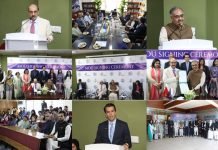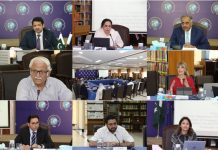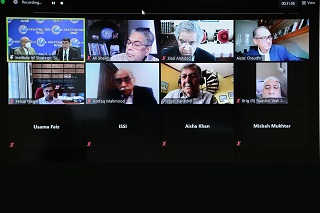PRESS RELEASE
Panel Discussion
on
Envisioning New Water Diplomacy in South Asia
March 9, 2021
The Centre for Strategic Perspectives (CSP), Institute of Strategic Studies Islamabad (ISSI) organized a Panel Discussion on “Envisioning New Water Diplomacy in South Asia,” on March 9, 2021. The panellists at the discussion included: Ambassador Shafqat Kakakhel, Chairman BoG, SDPI; Mr. Ziad Alahdad, former Director, World Bank; Mr. Ashfaq Mehmood, former Federal Secretary, Water & Power, GoP; Dr. Ali Tauqeer Sheikh, Consultant World Bank; and Mr. Feisal Naqvi, Senior Partner, BNR Law Firm. The discussion was moderated by Mr. Najam Rafique, Director CSP at ISSI.
Mr. Rafique opened the discussion by saying that water mechanisms need to be established by Pakistan to ensure water security vis-à-vis its neighbours. As Pakistan is a water stressed country, Water Diplomacy needs to become a part of Pakistan’s policy dialogues with its partners both at the bilateral and multilateral level.
Setting the tone for the discussion, Ambassador Aizaz Ahmad Chaudhry, Director General ISSI, said that Pakistan is faced with both internal and external issues of water management. In the case of Pakistan and India, both are dividing water, not sharing it. The challenge both countries face is how to make the Indus Water Treaty (IWT) work, which has been made superfluous since the Baglihar Dam issue. Another challenge is the politicisation of water issues in the region, which needs to be avoided to find adequate solution among regional states.
Ambassador Kakakhel said that transboundary water issues require cooperation between riparian countries. He said that most South Asian countries share river basins and have various bilateral agreements on water like IWT (Pakistan-India), Ganges Treaty (India-Bangladesh), and Mahakali Treaty (India-Nepal). But unfortunately, India has played a spoilsport in all of these bilateral treaties. The regional countries need to include water in their discussions and examine existing treaties and try to plug holes in them. Water and Climate Change issues need to be separated from political agendas in South Asia, which is already one of the least integrated regions in the world. Civil society linkages need to be established and strengthened in the region to talk on these issues.
Mr. Mehmood said that new ways of cooperation need to be formed in order to move forward in South Asia on water issues. Data sharing is one such method which can help in water diplomacy. a central body needs to be created in Pakistan which should deal with regional and transboundary water issues taking suggestions from across the region. Pakistan should take a leadership role in developing a water vision for the region.
Mr. Alahdad stated that India has enjoyed a favourable position over Pakistan since the signing of the IWT. India has taken aggressive and proactive steps to make IWT redundant and compromise the water supply to Pakistan. Building of water capacity in Pakistan is of utmost importance. For that, an integrated approach to water sector is needed. The country mismanages its water resources, and is also faced with environmental and growing population problems. Pakistan needs to strengthen the existing water treaties it has and try to have a comprehensive approach in water policy formulation.
Mr. Sheikh said that Indus Basin governance needs to be evaluated according to the current situation rather than looking to the past. Water needs to be seen as an economic commodity and water pricing is therefore important. Indus Basin needs to be respected with regards to ecosystem management. With regards to water diplomacy with respect to India, water should also be given equal importance as Kashmir. Strong relations are needed with Afghanistan and Iran on water and need focused approach. Ecosystem protection needs to be a shared responsibility across transboundary countries.
Mr. Naqvi emphasised that IWT provides Pakistan with strong basis to deal with Indian water aggression and talks about renegotiating its clauses should be avoided. IWT provides water security to Pakistan but better water resource management is also required from Pakistan. Environmental consequences of dams being built by India on rivers flowing into Pakistan needs to be highlighted to get better negotiating power in the international domain. With Afghanistan, Pakistan does not have a formal treaty, therefore Pakistan needs to use water diplomacy to achieve suitable settlement.
In his remarks, Ambassador Khalid Mahmood, Chairman BoG, ISSI, stated that no one can deny the importance of water. Right to water is internationally recognised but it’s a scarce resource. The problem of water in context of the region is not of technical issues but of political will. For that, water diplomacy among basin sharing partners is required. IWT is a good treaty and it provides the basis for further negotiations with India. Fresh water as a resource also needs to be protected in Pakistan.












